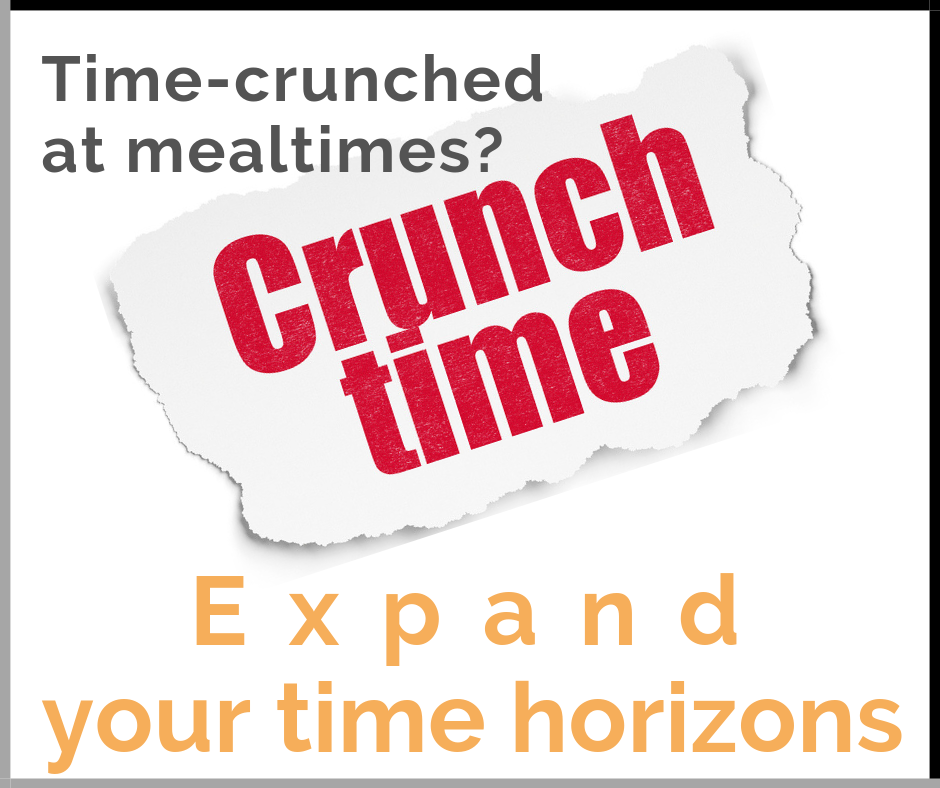
At one of my recent meal planning workshops, one participant explained the nasty time crunch she faced. While the specifics might vary, most of us have likely experienced similar crunches–maybe often!
Carolyn’s looked like this: Our workshop ran until 8:30 on a Thursday evening. Then she had to race home and get ready for a weekend away. The next morning she had another meeting. Then she was off on an 8-hour trip to a family event lasting all day Saturday and through Sunday morning. Then there was the 8-hour return trip getting her back late Sunday evening.
Carolyn knew she needed to plan ahead or it would be cheese and crackers for Sunday night’s meal. So at our Thursday workshop she planned for something better. That should have solved things—but it didn’t.
How can that be when I’m always claiming that meal planning is the magical solution for all our mealtime challenges? Because planning is only part of the solution.
The “Think Ahead” Part of the Equation
Ever notice how I talk about the “think-ahead-and-plan-habit” instead of just “meal planning?” That’s because there’s a crucial difference between the two.
While “meal planning” involves only the act of planning, the “think-ahead-and-plan-habit” involves both planning and thinking ahead. Only by doing both do you experience the full magic of this practice.
We can see this in Carolyn’s example. She planned a meal for Sunday, which was good. But making that meal was still going to be stressful and time-crunched. She had no food in the house and no time to shop before getting home late on Sunday. So after the long drive home, she would have to go shopping, pull a meal together and hopefully eat before 9:00!
Can you see the problem? While she had a plan, Carolyn didn’t have any “ahead” time, so she was left with only one, less-than-ideal option: stop by the store then go home and cook late on Sunday night.
With more “ahead time,” imagine the options that would have been available to reduce the crunch and stress of Sunday’s meal, like:
- shopping in advance sometime during the week for e.g., a quick Sunday stir-fry meal (or some other easy combo),
- making a soup or stew on Wednesday that could easily last until Sunday night, or
- making and freezing a big casserole the previous Sunday or Monday; transfer from the freezer to frig on Friday morning and it would be thawed a ready by Sunday night.
Expanding Your Time Horizons
The point–and magic–of the “think ahead and plan habit” lies in making healthy meals easeful and natural. This is critical so we really can and will make wholesome meals day after day (which is key to realizing the health benefits of a good diet.)
But to really experience this kind of magic, thinking ahead is as important as planning. And when it comes to thinking ahead, the more we can expand our planning time horizons, the more ease we will experience. Several day’s or even a week’s perspective gives us the leeway to work around meal making challenges with less panic and more grace. For instance:
- A meeting right at dinnertime? Sometime over the preceding couple of days, pack or pick up a salad to eat before or during
- Need to attend a meeting after dinnertime leaving little time for cooking? Make a big pizza a night or two before and just reheat leftovers
- A household member won’t be home until late? Make a pot of soup that’s easy to reheat
- Facing a super-exhausting day and know you won’t feel like cooking? Throw together a slow-cooker meal the night before and serve with steamed, pre-cut vegetables.
- Gone all evening with kid-activities? A couple nights in advance, make a transportable dish that tastes good at room temperature, e.g., quiche, vegetable patties, leftover cooked veggies with rotisserie chicken, baked potato topped with cheese and canned chili. You can skip McDonald’s and Wendy’s!
A Calming Flow
Just as you keep a running tab of work, social and other activities in your life, try keeping a bigger picture of the mealtime impediments coming up over the next several days or week. Then, when interference crops up on the horizon, start thinking ahead about how to navigate around it–just as you navigate around out-of-the-ordinary things like dentist appointments, haircuts, or meeting the dishwasher repair person at 2:00 in the afternoon.
Eventually you’ll find that, with a little lead time, meal making can be channeled to flow and work with your life–instead of being a wild card that you must push and shove to fit into your life puzzle. That’s when good meals will become easeful and natural–and something you can do regularly and consistently.
But What If?
Of course we’re not perfect and sometimes a mealtime impediment escapes our notice. Or something comes up last minute. There’s a strategy for these “back-against-the-wall” situations, too: Be Your Own Fast Food Restaurant. Read about it in the next newsletter.
Ready to Get in the Think-Ahead-and-Plan Habit?
Join my 4-week, online course available anytime; watch when and where you want.
Check it out and email or call if you have questions.
